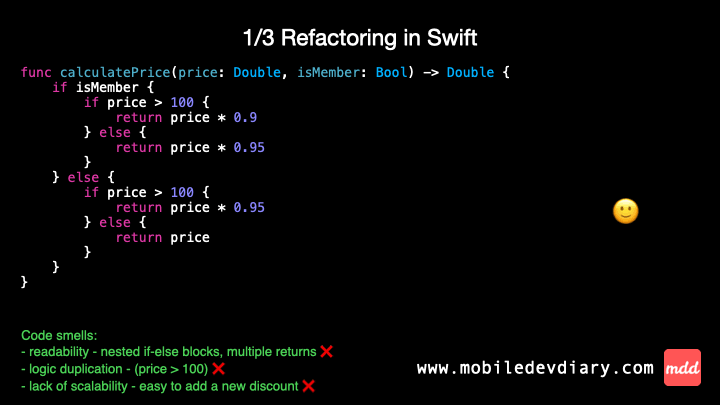Swift code refactor in action 👨🏻💻
Today, let’s talk about refactoring for clarity, maintainability, and scalability!
This time, the scenario is calculating the final price depending on the price and membership status.
This initial code has a few code smells:
- 1️⃣ nested ifs - impacts general readability, making the code hard to understand,
- 2️⃣ duplicated conditions - “price > 100” which violates the Don’t Repeat Yourself principle,
- 3️⃣ lack of scalability - not possible to easily add a new discount, it’d require to rework everything.
Checkout the gif or the post on my website to see how I solve these code smells and make the code cool, clean and scalable!
Gif ⤵️

Code ⤵️
#1
func calculatePrice_v1(price: Double, isMember: Bool) -> Double {
if isMember {
if price > 100 {
return price * 0.9
} else {
return price * 0.95
}
} else {
if price > 100 {
return price * 0.95
} else {
return price
}
}
}
#2
func calculatePrice_v2(price: Double, isMember: Bool) -> Double {
isMember ? priceForMember(price: price) : priceForNonMember(price: price)
}
func priceForMember(price: Double) -> Double {
price > 100 ? price * 0.9 : price * 0.95
}
func priceForNonMember(price: Double) -> Double {
price > 100 ? price * 0.95 : price
}
#3
func calculatePrice_v3(price: Double, isMember: Bool) -> Double {
apply(discount: isMember ? .member : .regular, to: price)
}
func apply(discount: Discount, to price: Double) -> Double {
price > discount.threshold ?
price * discount.premiumRate : price * discount.standardRate
}
struct Discount {
let threshold: Double
let standardRate: Double
let premiumRate: Double
static let member = Discount(threshold: 100, standardRate: 0.95, premiumRate: 0.9)
static let regular = Discount(threshold: 100, standardRate: 1, premiumRate: 0.95)
}
Thanks for reading. 📖
I hope you found it useful!
If you enjoy the topic don’t forget to follow me on one of my social media - LinkedIn, X, Mastodon, Bluesky or via RSS feed to keep up to speed. 🚀
